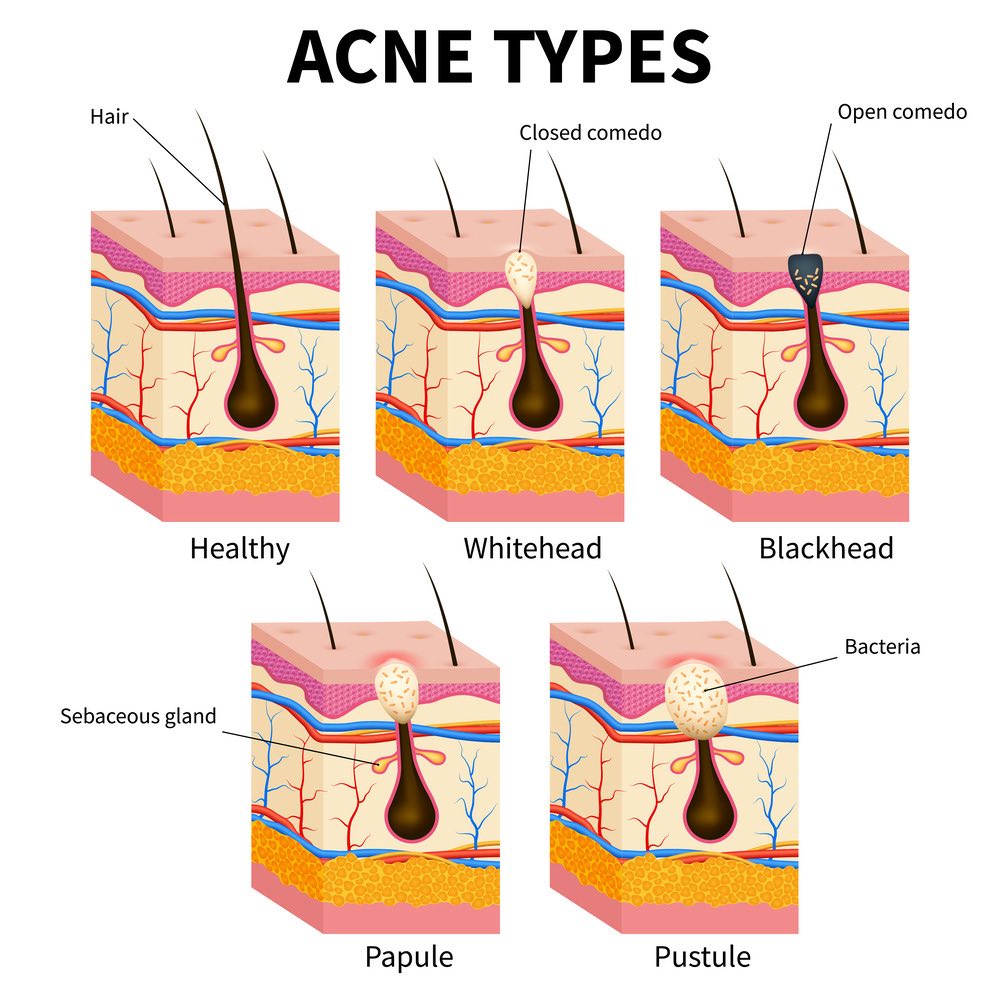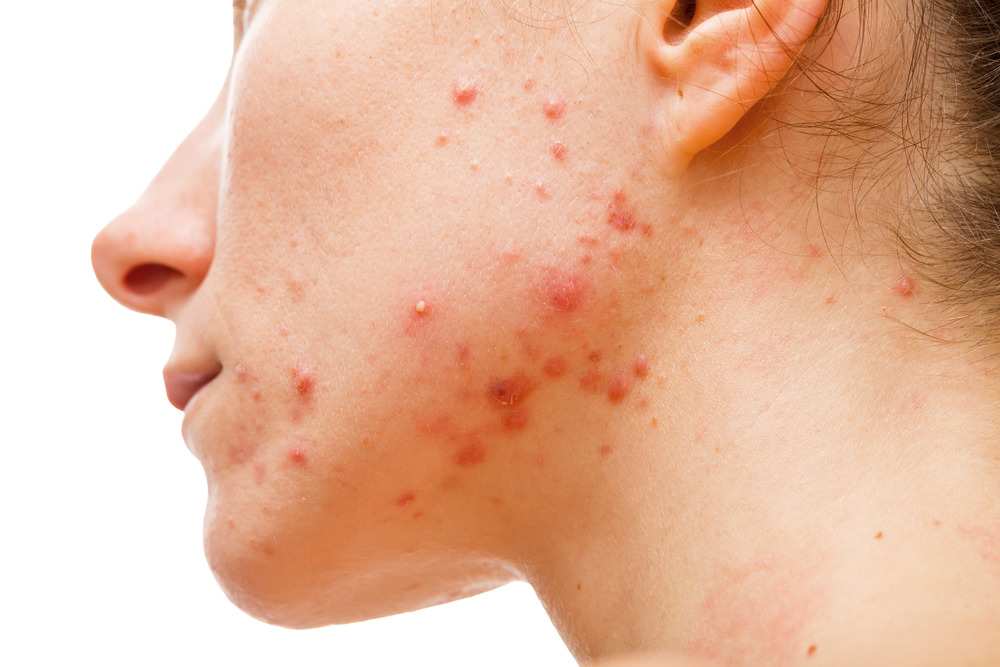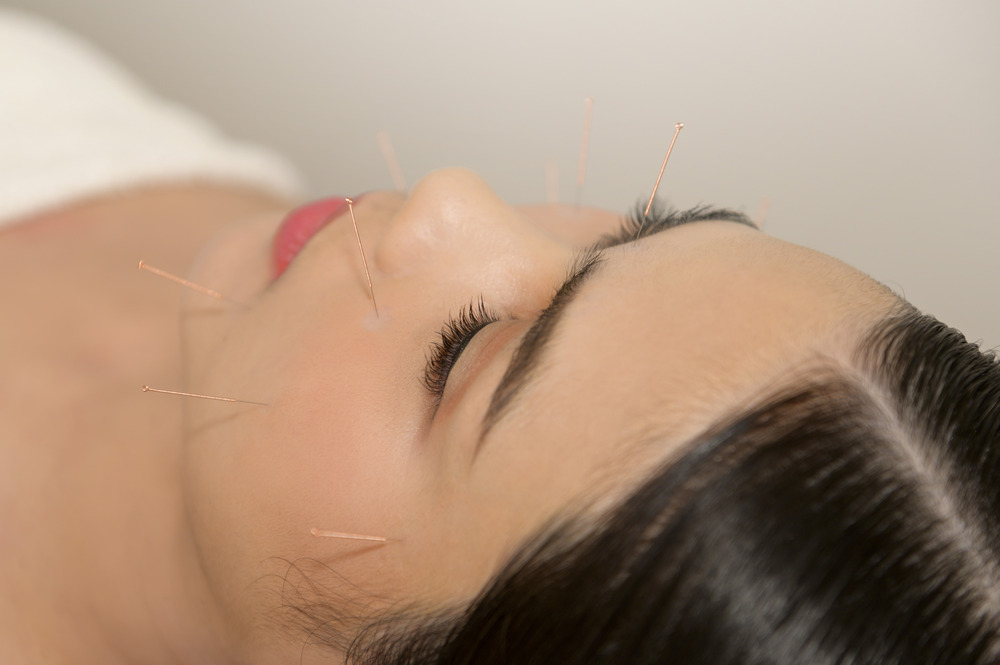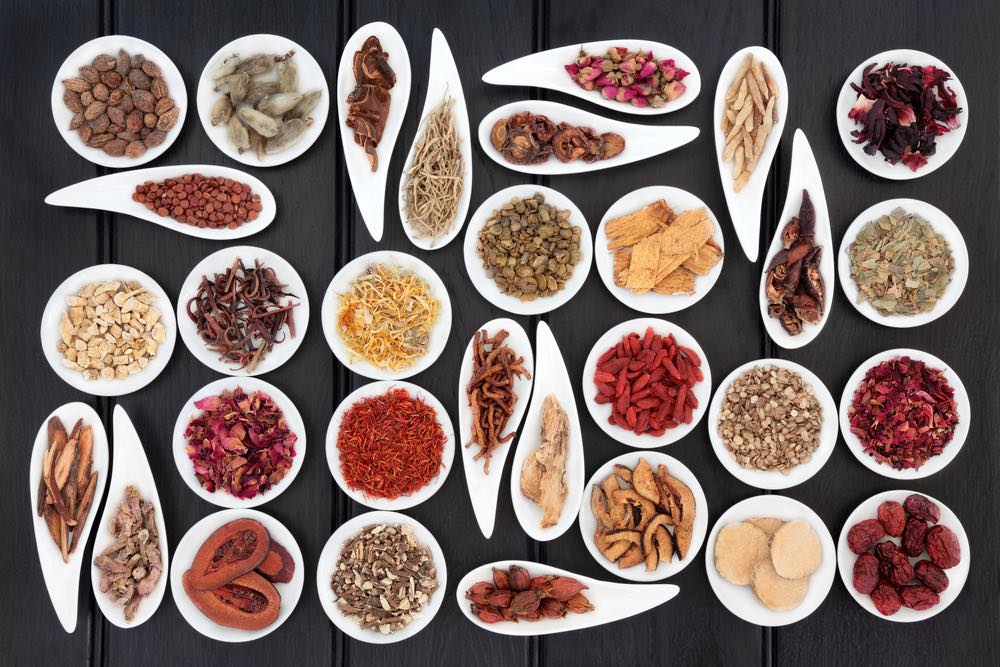Acne
Acne
In this article, I will tell you how acupuncture and Chinese medicine work to treat the root cause of acne and share how different treatment methods help reduce the condition.
Acupuncture and Traditional Chinese Medicine provide proven solutions for acne treatment. These natural methods work by harmonizing hormonal imbalances, reducing inflammation and bacteria levels, and restoring the flow of the body’s qi and blood.
Acne develops when skin pores become blocked with excess oil, dead skin cells, or other debris. A clogged pore becomes infected by bacteria which causes inflection and inflammation. The inflammation leads to the development of inflammatory acne with pustules, papules, and cysts. This is called the acne cycle.
Various factors, from hormones to diet, can influence this process, making the development of acne a combination of triggers. Chinese medicine is able to address many of the factors in the acne cycle leading to a long-term and sustainable reduction of acne.
The goal of the treatment is to correct the underlying imbalance causing the acne. Correcting the imbalance does not mean simply treating the symptoms or masking the condition, but rather correcting the root of the problem by encouraging self-healing of the body. As a doctor of acupuncture and a Traditional Chinese Medicine herbalist, I first identify the specific imbalance underlying the acne. Then, I use a combination of customized therapies including herbal medicine, acupuncture, LED light therapy, and cupping to correct that imbalance.

Types of Acne:
Acne develops within the hair follicles and sebaceous glands, which produce sebum—an oily substance that helps protect our skin. When these follicles get blocked, pimples, blackheads, and other acne lesions can emerge. This is why it is most common in areas of the body with many sebaceous glands, such as the face, back, and chest.
Blackheads (Open Comedones): Small black or dark spots on the skin, formed when a hair follicle’s opening gets clogged with dead skin cells and oil.
Whiteheads (Closed Comedones): Small, raised bumps with a white top, formed when a clogged hair follicle is trapped beneath the skin’s surface.
In Chinese medicine, dampness and heat are the main cause of whiteheads and blackheads. Other signs of dampness may be oily skin, fatigue, and poor digestion.

Papules: Small, red, tender bumps with no head.
Pustules: Pimples filled with pus, with a red base and white or yellowish tip.
In Chinese medicine, heat is a significant cause of inflammatory acne. Heat imbalances are reflected in red skin as well as red, inflamed papules and pustules. If there is very bad inflammation, it is called “toxicity.” Heat can also manifest as night sweats, excessive thirst, and constipation.
Cysts: Painful, pus-filled lumps beneath the skin’s surface, indicative of severe acne.
Nodules: Large, painful lumps situated deeper in the skin, representing a more severe form of acne.
In Chinese medicine, cystic acne is related to phlegm, heat toxins, and stagnation.
Common Causes and Triggers
Several factors can contribute to the development of acne:
Hormonal Changes: Many women find that their acne flares up during the premenstrual stage of their cycle. The acne is often a combination of whiteheads and blackheads with some inflammation involved. Hormones can cause an overproduction of sebum and faster skin cell turnover.
In Chinese medicine, hormonal acne can be related to stagnation, which is a lack of circulation in the body. Stress, which is a common cause of qi and blood stagnation, may also be a factor in the development of hormonal acne.
Excessive Oil Production: Overactive sebaceous glands can lead to clogged hair follicles.
In Chinese medicine, oily skin is a sign of dampness.

Bacteria and Inflammation: Propionibacterium acnes is a bacteria that lives. The bacteria will grow in the blocked pore leading to inflammation.
In Chinese medicine, infection and inflammation are related to heat, damp heat, and heat toxins.
Dietary Triggers: Dairy or with a high glycemic index exacerbate acne.
In Chinese medicine, sugary foods and dairy products lead to the accumulation of dampness and heat.
Other Factors: Including certain cosmetics, medications, and environmental pollutants
Acne within Chinese Medicine
Chinese medicine is a holistic system of healthcare with roots stretching back over 2,500 years. TCM views health and illness not in terms of isolated symptoms but by understanding the whole person. We will identify the underlying imbalance causing the acne and use herbal medicine, acupuncture, and other therapies to correct this imbalance.
Acne is most often associated with imbalances of heat, dampness, and blood stagnation. The imbalances can develop from stress, interaction with the environment, hormonal changes, or other causes.
Dampness- Dampness is the main cause of whiteheads and blackheads. People with dampness generally have oily skin and may sweat a lot. Dampness may occur from changes in hormones.
Dampness also comes from a diet high in sugars and dairy. This is why it is important to also consider your diet for acne.
Heat – Heat imbalances are reflected in red skin, red inflamed papules, and possibly pustules, papules, and crusts. This is often related to the infection caused by the acne bacteria as well as inflammatory acne. Inflammation is called “heat toxicity” in Chinese medicine.
Herbs that clear away the heat have been shown to have many antibacterial and anti-inflammatory properties.
Blood Stagnation- Blood stagnation occurs from hormone imbalances or if the acne has persisted for a long time. Acne along the chin line that is worse around the period, hormonal acne, will have some aspects of blood stagnation. Acne that worsens with stress will have some aspects of stagnation.
Herbs and acupuncture that help with blood stagnation help to increase circulation in the area to release the clogged pore. Wet cupping on the back will also be helpful for this type of acne.
Treatment Modalities in Chinese Medicine
I use a combination of customized therapies for treating acne to bring about the quickest and long-lasting results. These include acupuncture, LED light therapy, herbal medicine, and cupping.
Acupuncture:

Acupuncture helps acne by reducing inflammation, balancing hormones, stimulating circulation, and improving skin healing. I will often utilize “ashi” points, which point around the actual acne themselves as well as points throughout the meridians.
Ashi points help to move stagnant Qi, drain heat, and stimulate the skin healing process while points along the meridians address the underlying imbalances such as qi stagnation and dampness. Combining both local and distant points ensures that the treatment addresses both the branch symptom and the root cause of the acne.
Herbal Medicine:
Chinese herbal medicine works by correcting imbalances that contribute to breakouts, having antibacterial or anti-inflammatory effects on the skin, regulating of sebum production, and balancing hormones.

Chinese herbal medicine will combine specific herbs to address the underlying imbalances. The primary imbalances are damp heat, heat toxicity, qi stagnation, and phlegm accumulation. Damp heat can present itself as oily skin with inflammatory pustules, while heat toxicity might manifest as more severe, inflamed acne lesions. Qi stagnation relates to the blockage of of the circulation in the body and can be aggravated by emotional stress or breakouts around the menstrual cycle. Phlegm accumulation is most often associated with cystic acne.
Once these underlying imbalances are identified, specific herbal formulations are chosen to correct the imbalance. The selection of herbs if further refined even more to target specific factors in your acne such as herbs for excessive testosterone, herbs that target bacterial overgrowth, and herbs that reduce inflammation reduction. We also consider whole-body symptoms such as improving digestion and bloating and addressing issues in the menstrual cycle.
By correcting the underlying imbalances we can see long-term improvement.
LED Blue Light Therapy
LED blue light therapy specifically targets the acne-causing bacteria known as Propionibacterium acnes or P. acnes. These bacteria produce a certain type of molecule that, when exposed to blue light, ultimately causes the bacteria to destroy tself.
Using blue light therapy and acupuncture at the same time presents an innovative and synergistic approach to acne treatment. The light can be activated while the acupuncture needles are in place, typically 30 minutes. Special eye protection is always worn by the patient during the blue light treatment.
As the blue light works on the skin’s surface to eliminate P. acnes bacteria and reduce inflammation, the acupuncture needles work beneath the skin to stimulate energy flow, address qi stagnation, speed healing, and rectify imbalances being able to target the condition on many levels.
Cupping:
Cupping helps to increase circulation, clear the body of toxins, reduce heat, and stagnation. It can also help to detoxify the body, potentially reducing acne triggers.
Wet cupping or bleeding cupping on the back is the most effective technique for the treatment of acne. The process involves creating a small prick with acupuncture on the skin’s surface and then applying suction cups. This therapy helps to reduce heat, eliminate of toxins, increase blood flow, and reduce stagnation.
Studies have shown wet cupping to have anti-inflammatory and antioxidant properties.
Some common side effects include mild discomfort and bruising but these usually resolve within a week.
Dietary Therapy:
Traditional medicine has been saying that diet plays a large role in the development of acne for thousands of years. It is now well accepted that foods with a high glycemic index as well as dairy products, in particular, are associated with acne development.
TCM views food not just as sustenance but as medicine. Dietary therapy in TCM involves recommending certain foods and avoiding others based on their energetic properties and the individual’s constitution and imbalances. Choosing the right foods and avoiding others can address dampness or heat, as well as strengthen the digestive system which is closely linked with skin health.
Assessment and Diagnosis:
Chinese medicine considers the whole person when approaching acne. During our initial consult, we will conduct a thorough medical assessment, which includes asking about your medical history, lifestyle, diet, stress levels, and other whole-body issues. I will also look at your tongue and take your pulse.
Most importantly, I will also observe your skin looking for the location of the acne, type of acne, and general appearance of the skin. This will reflect the underlying imbalances causing the acne.
Based upon the imbalance I will create a personalized treatment to address the root cause. This will often be a combination of acupuncture and Chinese herbal medicine.
Herbal medicine is taken as a strong tea. I may also discuss topical herbal medicine for you. As the acne’s nature and severity change, or as other symptoms arise, the herbal formula may be adjusted to address those changes. For those who cannot come in regularly for acupuncture, herbal medicine can be a powerful treatment on its own.
Regular acupuncture treatments are often a part of the treatment. These sessions aim to harmonize the body’s energy flow, reduce inflammation, and stimulate healing. We may include LED blue light therapy with the acupuncture.
The course of treatment varies significantly among individuals but it is generally 3-6 months. . Most people see improvements within weeks, but to address the underlying imbalances we may need a more extended course over several months. Factors affecting duration include the acne’s severity, its root cause, and your overall health and constitution.
Once the active phase of treatment concludes and the acne is under control we may provide maintenance herbal medicine or acupuncture.

Conclusion:
Chinese medicine offers a unique and holistic approach to acne. By addressing the underlying imbalances we can see long-term improvement. In doing so, it not only targets the visible blemishes but also promotes overall systemic health.
The customized, individual-focused approach of Chinese Medicine, from tailored herbal prescriptions to acupuncture sessions, provides a multi-faceted and natural pathway to clear skin and balanced internal health.
To make an appointment please call us at 212.319.5757
Or you can make Your Appointment Online.
Feedback From our clients…
“Before visiting Dr. Alban’s office, I had been suffering with severe inflammatory acne for about 2 or 3 years. I tried topicals, face washes, and other remedies, none of which could keep the acne away. After the first few weeks of personalized herbs and acupuncture, I noticed less inflammation and my skin was healing and clearing up. Most of us want immediate results, but I knew that my body needed to take its time to come back to a balance. We were treating the root cause. Now, my skin is clear and I do not need to take herbs any longer. I always recommend Dr. Alban to friends and family because I truly trust his knowledge in TCM and I am super grateful for the work that he does.”
~ C.A., Connecticut